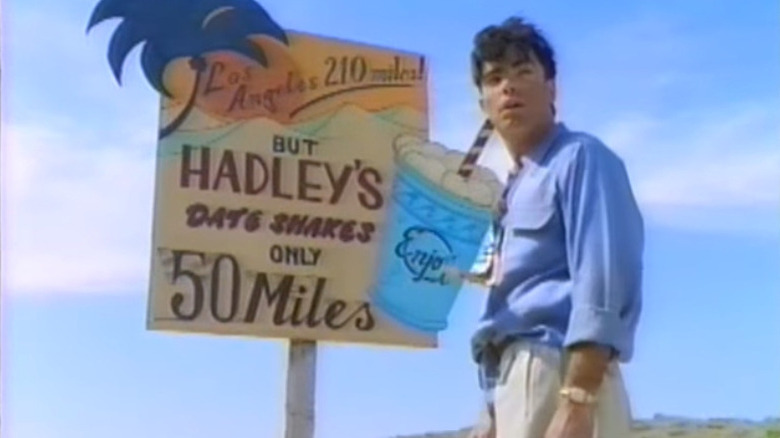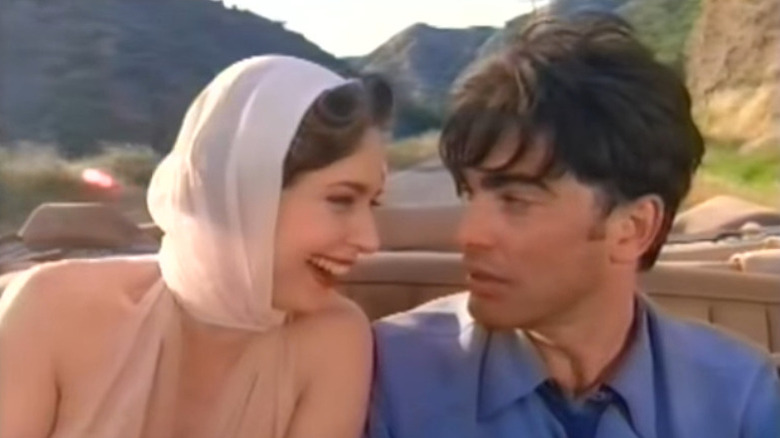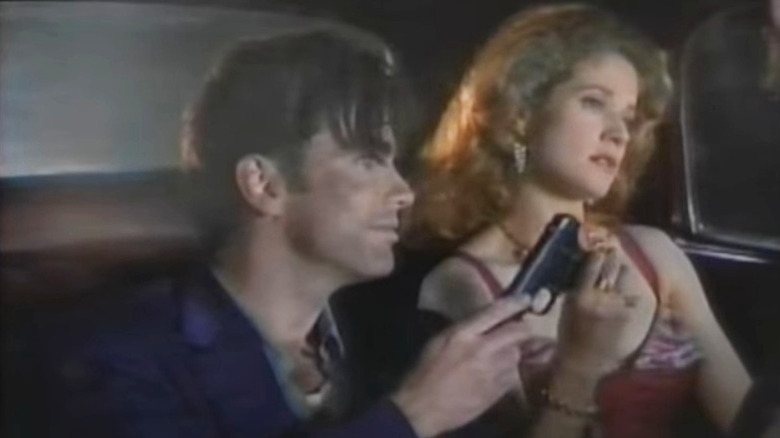You've Probably Never Seen The One Thing Tom Cruise Actually Directed
Tom Cruise is famous for a lot of things.
He's starred in lots of popular movies, like "Top Gun" and "Mission: Impossible". He publicly shamed Brooke Shields for taking antidepressants to deal with her post-partum depression. He jumped on a sofa that one time. His third wife Katie Holmes had to engage in an elaborate deception involving secret cell phones to extricate herself from their marriage. He recently said he's planning on seeing "Oppenheimer" before "Barbie", so that's nice.
The list goes on. But one thing Tom Cruise is not famous for, despite being notoriously hands-on in the movies he produces, is directing. The 61-year-old actor has been making movies for 42 years and he's never stepped behind the camera to direct any of his own films.
But that doesn't mean he's never directed anything. Cruise actually has one directing credit on his résumé — just one — and while it may be for an episode of a television series you've probably never heard of, it's a fascinating half-hour full of artistic choices that intersect with and reflect on Cruise's public persona.
Let's talk about the time Tom Cruise directed a story about a guy who looks a lot like Tom Cruise, who takes unnecessary risks and is easily manipulated by con artists, and who makes his wife — who looks a lot like Nicole Kidman — miserable.
It's not TV, it's HB... oh wait, it's Showtime
The early days of premium cable stations like HBO and Showtime were a wild west for edgy TV shows. All of a sudden you could make a series with sex and violence and actually show all the sex and violence. For example, "Dream On" was in many ways a typical sitcom about a single dad trying to find love in the big city, except it was on HBO, so his sex life wasn't implied, it had real nudity in it.
Before cable stations doubled down on expensive, long-form programming like "The Sopranos" and "Dexter," one of the most popular genres was the old-fashioned anthology series. Every week, there would be a new story, a new director, and a new cast. The high visibility, limited time commitment, and relative creative freedom allowed networks like HBO and Showtime to attract top-tier celebrity talent for weird programs like the ultra-violent "Tales from the Crypt," or even Shelley Duvall's family-friendly "Faerie Tale Theatre."
Into that strange world of turn-of-the-century premium cable anthologies came "Fallen Angels," a Showtime series where every episode was a short film noir story. Though largely forgotten today, the show was executive produced by Oscar-winner Sydney Pollack — who directed Tom Cruise in "The Firm", which came out the same summer "Fallen Angels" debuted — and enlisted a cavalcade of talent in front of and behind the camera, including actors like Brendan Fraser, Laura Dern, Gary Oldman, Danny Glover, Alan Rickman, and Tom Hanks, as well as directors like Alfonso Cuaron, Steven Soderbergh, Peter Bogdanovich, Agnieska Holland, and ... well, Tom Hanks.
Oh yeah, and Tom Cruise directed an episode too.
The Frightening Frammis
Tom Cruise's episode, "The Frightening Frammis", is based on a story by Jim Thompson ("The Grifters"), and stars Peter Gallagher ("Sex, Lies, and Videotape") as Mitch Allison, a grifter whose wife Bette (Nancy Travis, "So I Married an Axe Murderer") has just pulled a massive scam. While she's asleep, Mitch runs his hand over her naked body, but only because he's looking for loose cash that fell out of their ill-gotten gains. Nothing sexual about it. Then he absconds with the money, in the hopes of doubling it by conning hapless boobs on a train headed out of town.
Mitch is a risk-taker and a con man, but his risks don't pay off and he's easily conned. An elderly couple scam him out of every penny he has, then he gets thrown off the train. While hitchhiking, a pair of bickering newlyweds pull over. Babe (Isabella Rossellini, "Blue Velvet") flirts with him, as her husband Martin (John C. Reilly, acting under the name "John Reilly," which probably explains why the role is incorrectly credited on IMDb) realizes he's made a huge mistake, gets out of the car, and jumps off of a cliff.
Nonplussed, Babe enlists Mitch to impersonate Martin in order to cash his fortune in traveler's checks, but instead of splitting the money Babe double-crosses him, leaving Mitch to be tortured nearly to death by a creepy mob goon named Ugolino (Joe Viterelli, "The Firm"), who says the money belongs to his bosses. Mitch gets saved at the last minute by Bette and puts his lips up to her gun by way of apology. After a few last-minute twists, the tale ends with Bette stroking his ego a little, and Mitch finally handing her the story's phallic symbol, that gun, which she puts in her lap as the credits roll.
Introspection: Possible?
It's tempting to look at "The Frightening Frammis" as a conscious or subconscious expression of the filmmaker who made it, so let's do that. Maybe we're reading too much into this, but it's literally the only time in Tom Cruise's career where he was in the director's chair, making all the creative decisions. It invites closer analysis as a personal artistic statement than even a film like "Top Gun: Maverick," which already seems to say a lot about Cruise's self-image.
"The Frightening Frammis" is, more than anything else, the story of a guy who thinks he's a dashing leading man who can do no wrong, but discovers to his dismay that he's not. He's not a leader, he's not clever, he's not even genuinely appealing to the opposite sex. Other people use him to get what they want (just money) by making him pretend to be other people, and when he tries to gain control over his own life in a similar way, it jeopardizes the only meaningful relationship he's apparently ever had. His wife, who is in the same business he is, and who seems visually modeled after Nicole Kidman (Cruise's second wife), is constantly infuriated by this guy but keeps forgiving him because he's like a clueless puppy who won't stop chasing cars. Even the episode's happy ending is pointedly emasculating, with the protagonist conceding that his wife should have the story's phallic symbol.
If we consider the possibility that the protagonist — who Tom Cruise made look kinda like Tom Cruise — represents (on some level) Tom Cruise, then "The Frightening Frammis" is a relatively unique entry in Cruise's résumé, expressing vulnerability and uncertainty about his own carefully crafted celebrity persona, and maybe his life choices overall. If so, this episode isn't just fascinating, it's indispensable to his filmography.
Naturally, it's not available on home video or streaming. (Not officially anyway.)



